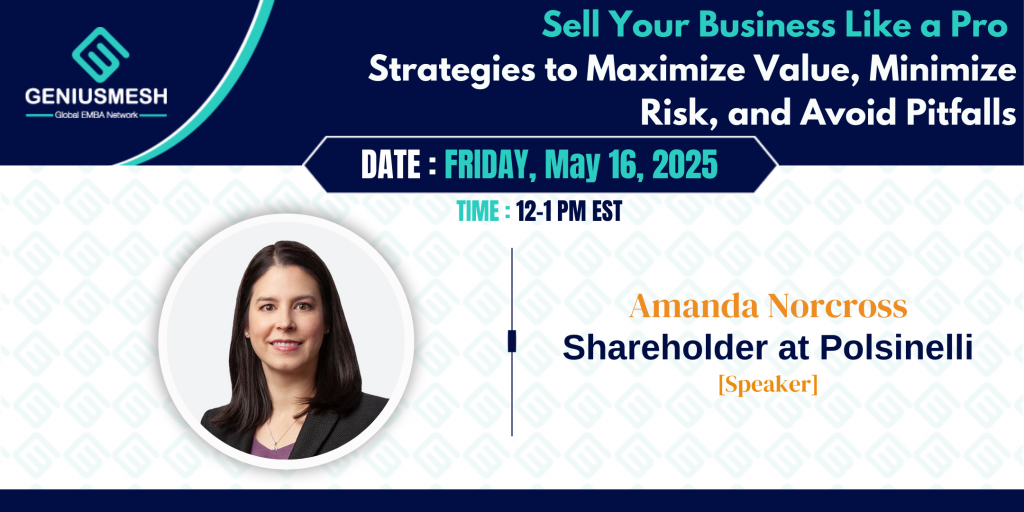At GeniusMesh, we recently hosted a session on selling your business like a pro with Amanda Norcross, a shareholder at national law firm Polsinelli, focused on one of the most important milestones in a founder’s journey: selling your business. With her deep experience in mergers and acquisitions, Amanda walked our executive audience through the key strategies, decisions, and mistakes to watch for when preparing for a successful exit.
Whether you’re planning a sale this year or just starting to think about it, here’s what you need to know.
The Market Is Active: Why That Matters
Amanda opened with a powerful insight: now is a strong time to sell.
- Buyers are active. Private equity firms and corporate acquirers are flush with capital.
- Valuations are healthy. Post-pandemic market stabilization has led to renewed acquisition appetite.
- Hot sectors include: Health Care, Tech, Infrastructure, Financial Services, Consumer Products, and Agri/Food.
Selling Your Business: Define Your Goals First
Every business sale should start with one clear question:
What do you want from this transaction?
Some founders are looking to maximize price. Others want to pass their company to family, empower employees through an ESOP, or find a strategic buyer who can scale their legacy.
Amanda emphasized that your personal and professional goals should determine the timing, structure, and partners for your exit.
Know Your Exit Options
Amanda outlined three common paths to selling a business:
- Third-party sale – to a PE firm or strategic buyer (typically highest value)
- Internal transition – to family members or existing partners
- Employee ownership – through ESOPs or management buyouts
Each option carries implications for control, taxes, timing, and long-term involvement. Choosing the right one starts with clarity on your objectives.
How to Prepare for a Strong Sale
Amanda shared a practical framework to maximize value before going to market:
Financial Housekeeping
- Get reviewed or audited financials
- Track EBITDA consistentl
- Conduct a Sell-Side Quality of Earnings Report
Know Your Minimum Sale Price (MSP)
- Identify your walk-away number
- Compare it with your Fair Market Value (FMV)
- If FMV is greater than MSP, you’re ready for a formal sale process
Build Your Team
- M&A attorney
- Tax and finance advisors
- Investment banker to manage outreach and competition
Why a Sell-Side Banker Can Make or Break the Deal
Many sellers underestimate how much value an investment banker adds. Amanda explained that experienced bankers:
- Prepare marketing materials and pitch decks
- Identify and approach the right buyers
- Create competition to drive up the price
- Keep the process moving efficiently
They also allow you to focus on your business because missed performance targets during a sale can lead to price drops or re-negotiations.
Prepare for Buyer Scrutiny
Buyers will go deep during due diligence. Amanda’s advice:
- Use a strong NDA early on
- Prepare a clean data room with key documents
- Be transparent about known risks and lead with your solutions
- Consider Representations and Warranty Insurance to reduce risk
Mistakes That Cost Time and Money
Amanda shared a few “war stories” from real deals to illustrate common pitfalls:
- Signing an LOI too early without legal review created tax issues
- Skipping bankers led to lowball offers and missed buyer interest
- Avoiding due diligence such as environmental audits delayed closings and required large escrows
- Neglecting sales tax compliance led to buyer indemnification demands
- Missing cap table documentation caused costly late-stage restructuring
Final Advice: Start Early and Stay Intentional
Amanda closed with one clear message:
You don’t need to be ready to sell tomorrow to start preparing today
If you think a sale could happen in the next 1 to 3 years, start organizing now. Clarify your goals, clean up your financials, and build a team you trust.
“The best deals are proactive, not reactive. Preparation gives you leverage.”

The GeniusMesh team is a group of experts who are pioneers in executive hiring, unparalleled expertise in identifying and securing top-tier leadership talent. We have people from the top 30 Business schools across the globe who write thought-provoking content on Private Equity, Healthcare, Supply chain, Manufacturing, Technology, Finance, Venture Capital & other niches.
GeniusMesh is a pre-vetted network of 12k+ Executive MBAs who have over 16 years of operational & functional experience.



